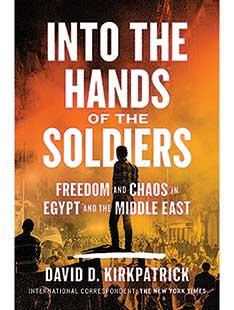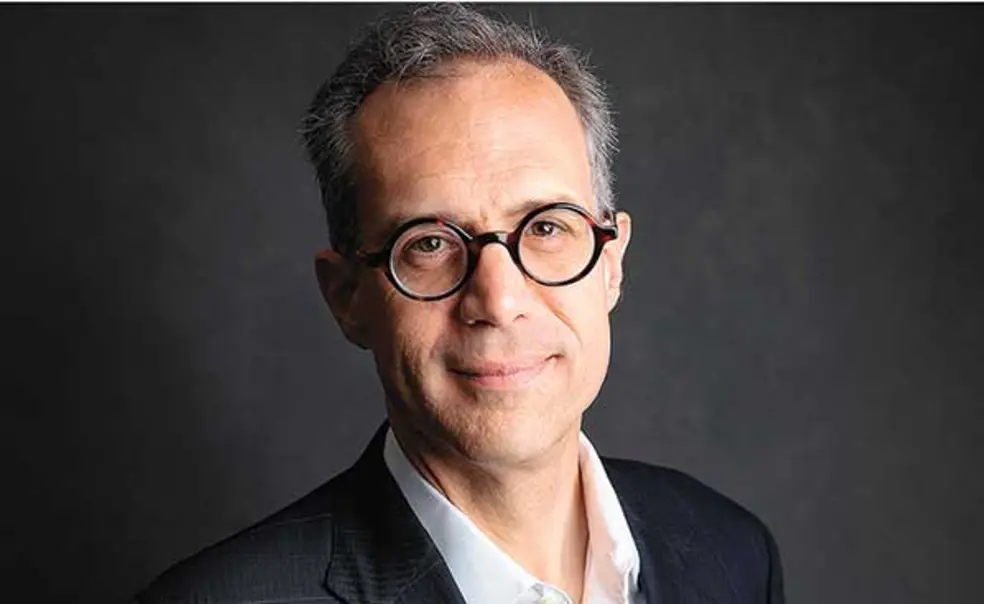New York Times correspondent David D. Kirkpatrick ’92 made headlines this week when Egyptian officials detained him in Cairo and then escorted him onto a flight back to London. The following interview with Kirkpatrick, about his new book Into the Hands of the Soldiers, was conducted weeks before the incident and will be part of our March 6, 2019, print issue.
In the summer of 2010, New York Times reporter David D. Kirkpatrick ’92 flew to Cairo for his first overseas posting. Experts back in Washington told him not to expect much. President Hosni Mubarak had been in power for decades. That didn’t seem likely to change.
The Arab Spring erupted just months later, and he found himself plunged into one of the world’s biggest stories. Into the Hands of the Soldiers: Freedom and Chaos in the Middle East (Viking) is the narrative of his six years in Egypt — the hope that blossomed in Tahrir Square in 2011 and its quashing, two years later, by a coup that installed yet another strongman.
He spoke to PAW about his book, which features many actors — activists, politicians, diplomats, and generals — and their attempts to make sense of the shifts in the Middle East.
What didn’t we in the United States understand about the Arab Spring?
If there’s one thing, it was identifying the uprising in Tahrir Square with a small group of very charismatic, English-speaking, tech-savvy young people. It created a misimpression that this was a Facebook and Twitter revolution. What really made the uprising happen in Tahrir Square, the magic that made it triumph over Mubarak, was the unity of different factions — of Islamicists and liberals, old people and young people, rich and poor.

You write that a muddled U.S. policy undermined attempts to sustain democracy. What happened?
There was always a war over what the Obama administration’s policy toward Egypt should be. Hopes for a new kind of government in the Arab world and a new kind of relationship with the people of Egypt were always up against fears of what that change might look like — and a comfort with the old authoritarians. In the last days before the coup in 2013 — when the elected president, Mohamed Morsi, was removed — President Obama was on the phone with him, trying to coach him about how to hold on — while others in his Cabinet were variously telling people in Egypt and around the region: “Go ahead and do what you have to do. This guy [Morsi] is untenable.”
Experts in 2010 expected your posting to be uneventful. What did they miss?
The same experts who said nothing is going to happen in Egypt would often say that sooner or later these old Arab authoritarian governments are going to collapse because they can’t serve the needs of their growing populations — and because they’re hopelessly corrupt, and there are no built-in mechanisms for them to reform or change. What people didn’t realize is that it would happen all at once. Nobody anticipated that one spark in Tunisia was going to set the whole Arab world ablaze.
Should we give up trying to bring democracy to the Middle East?
I’m not sure that democracy is the most useful term, and I’m not sure it’s our business to be bringing anything anywhere. But I do think that the kind of system that prevailed in the Middle East — and especially in Egypt for the previous seven decades — has proven itself unable to continue. That old order is in tatters across the region.
Once Abdel Fattah el-Sisi replaced Morsi as president, how dangerous was it for you to do reporting there?
The day of the massacre at Rabaa Square [in August 2013], journalists were killed, and some were arrested. Most of those who were arrested were Egyptians. By and large, the worst thing that could happen to a Western journalist is you would be detained for a short time and sent out of the country.
What lessons did you come away with about how the U.S. conducts foreign policy?
It’s much more haphazard than I would have guessed and than many people in the region would anticipate. Also, as anybody who’s worked in the State Department would tell you, there’s a really strong impulse to be friends with whoever is in power at the moment.
Interview conducted and condensed by E.B. Boyd ’89
This an expanded version of a story from the March 6, 2019, issue of PAW.












No responses yet